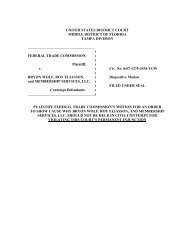Gasoline Price Changes - Federal Trade Commission
Gasoline Price Changes - Federal Trade Commission
Gasoline Price Changes - Federal Trade Commission
You also want an ePaper? Increase the reach of your titles
YUMPU automatically turns print PDFs into web optimized ePapers that Google loves.
THE DYNAMIC OF SUPPLY, DEMAND, AND COMPETITION<br />
$ Since 1973, Production Decisions by OPEC Have Been a Very Significant Factor in the<br />
<strong>Price</strong>s That Refiners Pay for Crude Oil.<br />
The Organization of Petroleum Exporting Countries (OPEC) is a cartel designed<br />
specifically to coordinate output decisions and to affect world crude oil prices. 5 Beginning with<br />
OPEC’s first successful assertion of market power in 1973-1974, market forces no longer were<br />
the sole determinant of the world price of crude oil. At that time, OPEC members agreed to limit<br />
how much crude oil they would produce and to embargo the sale of crude oil to the U.S. OPEC<br />
members adhered to the production limits and, when OPEC lifted the embargo six months later,<br />
crude oil prices had tripled from $4 to $12 per barrel.<br />
The degree of OPEC’s success in raising crude oil prices has varied over time. OPEC<br />
members can be tempted to “cheat” and sometimes sell more crude oil than specified by OPEC<br />
limits. Higher world crude prices due to OPEC’s actions increased the incentives to search for<br />
oil in other areas, and crude supplies from non-OPEC members such as Canada, the United<br />
Kingdom, and Norway have increased significantly. In 2003, almost 30 years after the first oil<br />
embargo, OPEC’s total crude production was about the same as in 1974, but accounted for only<br />
38 percent of world crude production, as compared to 52 percent of world crude oil production in<br />
1974. Another countervailing force against higher crude prices has been new technologies that<br />
aid in finding new oil fields and lowering extraction costs.<br />
Nonetheless, OPEC still produces a large enough share of world crude oil to exert market<br />
power and strongly influence the price of crude oil when OPEC members adhere to their<br />
assigned production quotas. Especially when demand surges unexpectedly, as in 2004, OPEC<br />
decisions on whether to increase supply to meet demand can have a significant impact on world<br />
crude oil prices.<br />
$ Over the Past Two Decades, the Demand for Crude Oil Has Grown Significantly.<br />
The demand for crude oil depends on the demand for refined products, such as gasoline,<br />
diesel fuel, jet fuel, and heating oil. Since 1982, gasoline has accounted for 49 to 53 percent of<br />
the daily consumption of all petroleum products. Crude oil consumption has fallen during some<br />
periods over the past 30 years, partially in reaction to higher prices and federal laws such as<br />
requirements to increase the fuel efficiency of cars. <strong>Gasoline</strong> consumption in the U.S. fell<br />
significantly between 1978 and 1982, and remained lower during the 1980s than it had been at<br />
the beginning of 1978. See Figure 3-6, supra.<br />
Overall, however, the long-run trend is toward significantly increased demand for crude<br />
oil. Over the last 20 years, average daily U.S. consumption of all refined petroleum products<br />
increased on average by 1.5 percent per year, leading to a total increase of 30 percent. As a<br />
result, worldwide demand for crude increased by 27 percent between 1988 and 2004. One would<br />
EXECUTIVE SUMMARY v
















